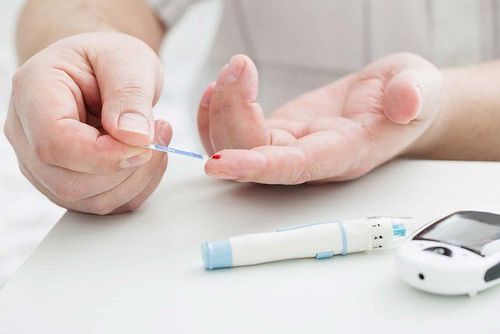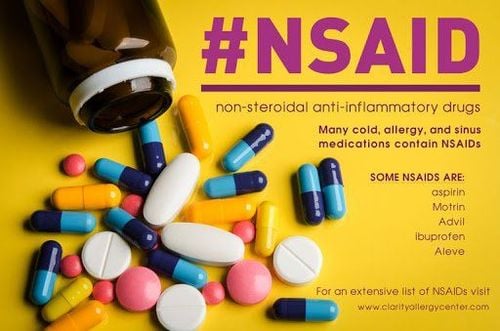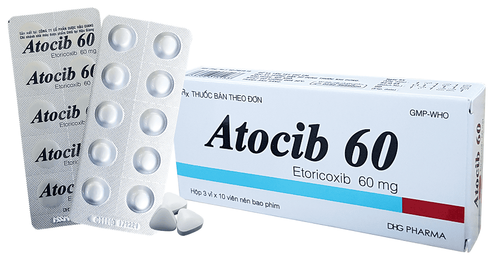This is an automatically translated article.
Corticosteroids are widely used to treat many different diseases. Among the most common is methylprednisolone. So what is methylprednisolone and how is it used?
1. What disease does methylprednisolone treat?
Methylprednisolone is used to treat conditions such as osteoarthritis, blood abnormalities, some dangerous allergic reactions, certain cancers, eye diseases, skin, kidney, intestinal and lung disease or immune system abnormalities.
The drug methylprednisolone works by suppressing the body's immune system in response to various diseases, thereby helping to relieve unpleasant symptoms such as swelling, pain and allergies. Corticosteroids are essentially a hormone of the body (cortisol). Therefore, the drug methylprednisolone is also used with some other drugs to treat hormonal disorders in the body.
2. How to use the drug methylprednisolone
Methylprednisolone is taken by mouth as directed by your doctor, usually after a meal. Follow your doctor's treatment instructions carefully. The dose of the drug depends on the severity, condition and response to treatment of each patient.
The drug methylprednisolone comes in several different daily dosing regimens. It can be taken at the same dose every day or every other day as prescribed by your doctor. If you have any questions, consult your treating doctor or pharmacist directly or through home health services.
Do not arbitrarily increase the dose or use it longer than directed by your doctor. Because if used in the wrong way, the condition may not improve much and the risk of side effects is higher.
Do not suddenly stop taking methylprednisolone without your doctor's prescription. Some bad problems can happen if the medicine is stopped suddenly. The dose of methylprednisolone should be gradually reduced before stopping completely.
If the drug is stopped suddenly, the patient may develop a corticosteroid withdrawal syndrome (common such as fatigue, weight loss, nausea, myalgia, headache, dizziness). Withdrawal syndrome is more likely to occur if patients use methylprednisolone for a long time or in high doses.

Thuốc methylprednisolone được sử dụng để điều trị một số bệnh như viêm xương khớp
3. The side effects of the drug methylprednisolone
Common side effects when using methylprednisolone include: nausea, vomiting, heartburn, headache, dizziness, sleep disturbances, changes in appetite, increased sweating or acne... If serious or persistent side effects occur, notify your doctor right away.
The drug methylprednisolone may affect the patient's blood sugar, so it may increase the risk of disease or worsen the condition of diabetes. Tell your doctor if you notice signs of high blood sugar, such as feeling thirsty or urinating a lot.
For patients with diabetes, it is advisable to check your blood sugar regularly and talk to your doctor if there is an abnormality. Your doctor may need to adjust the dose of your blood sugar control drugs, and change your lifestyle or diet to more closely control your blood sugar.
The drug methylprednisolone suppresses the immune system, so it reduces the body's resistance to infections. As a result, the patient is more susceptible to bacterial attack (but rarely death) or worsening of existing infections. Consult your doctor at any signs of infection (such as fever, chills, persistent sore throat, cough, white patches in the mouth).
Serious side effects, including:

Bạn dễ xuất hiện các vết bầm tím có thể là dấu hiệu tác dụng phụ nghiêm trọng của thuốc methylprednisolone
4.Measures to prevent side effects caused by the drug methylprednisolone

Nếu bạn bị đái tháo đường hãy khai báo với bác sĩ tránh nguy cơ gặp tác dụng phụ khi sử dụng thuốc
Before using methylprednisolone, talk to your doctor about your allergy history, including allergies to methylprednisolone or prednisone or any other allergies.
Before starting treatment, tell your doctor or pharmacist your medical history such as:
Blood abnormalities such as easy bleeding, blood clots; Osteoporosis ; Diabetes ; Eye diseases (such as cataracts, glaucoma, herpes infections of the eye); heart problems (such as heart attack or congestive heart failure), high blood pressure; Current infections (such as tuberculosis, herpes, fungal); Liver and kidney disease; Psychiatric abnormalities: psychosis, depression, excessive anxiety; Gastrointestinal problems (such as diverticulitis, ulcers, ulcerative colitis); Epileptic. Measures to reduce side effects of the drug methylprednisolone:

Xuất huyết dạ dày do tác dụng phụ của thuốc methylprednisolone
The drug methylprednisolone can cause stomach bleeding. Alcoholic patients are therefore at increased risk of this side effect, so alcoholic beverages should be limited; The drug methylprednisolone makes the body more susceptible to infection or makes an existing infection worse. Therefore, keep your body clean to prevent the spread of germs. Limit contact with patients with contagious diseases such as chickenpox, measles, flu... Consult your doctor about infections when taking methylprednisolone; Methylprednisolone can make some vaccines ineffective. Live vaccines can affect the body if given during treatment with methylprednisolone . Therefore, do not vaccinate without the consent of the treating physician; Long-term use of corticosteroids (including methylprednisolone) can cause the thyroid to respond to physical stress. Therefore, before surgery, emergency treatment, or if you have a serious illness or injury, tell your treating doctor that you are taking or have used methylprednisolone within the last 12 months. Consult your doctor if you have any abnormalities, fatigue or weight loss; The elderly are more susceptible to the side effects of methylprednisolone, particularly bone fractures or pain, gastrointestinal bleeding, and mental changes (such as confusion).
The drug methylprednisolone slows down the growth of children if used for a long time. Monitor and check the height and growth of children regularly if they are being treated with methylprednisolone.
Pregnant women only use methylprednisolone when clearly needed. Although it rarely harms an unborn baby, the benefits and risks of this drug must be weighed. In particular, babies born to mothers who have used the drug methylprednisolone for a long time may have hormone problems.
The drug methylprednisolone passes into breast milk but is unlikely to harm a nursing infant, so consult your doctor before breast-feeding.
5.Methylprednisolone drug interactions

Các loại thuốc NSAID có thể gây tương tác với thuốc methylprednisolone
Drugs that can interact with methylprednisolone include:
Aldesleukin; Mifepristone; Drugs that can cause bleeding, bleeding such as antiplatelet drugs clopidogrel, anticoagulants such as warfarin, dabigatran; NSAIDs such as ibuprofen, celecoxib, aspirin... For patients who are taking low-dose aspirin to prevent heart attack or stroke (dose range from 81-325mg per day), continue taking it unless your doctor tells you otherwise. other instructions. Some drugs reduce the elimination of methylprednisolone from the body and affect the effects of methylprednisolone, including:
azole antifungals (such as ketoconazole); Boceprevir, Cyclosporine, Estrogen, HIV protease inhibitors (such as ritonavir); Macrolide antibiotics (such as erythromycin), rifamycins; Certain medicines to treat seizures (such as phenytoin, phenobarbital). The medicine methylprednisolone can affect and distort the results of some tests. Therefore, to be sure, you should immediately tell your doctor or laboratory technician if you are using this medicine.
Using methylprednisolone for a long time, the patient should be examined and tested (including blood sugar, electrolytes, blood pressure measurement, eye exam, bone density measurement, height, weight measurement) periodically to monitor disease progression or check for side effects.
Long-term use of methylprednisolone can cause osteoporosis. Measures to help keep bones healthy include lifestyle changes, maintaining a healthy weight, exercising, quitting smoking, getting more calcium and vitamin D, and limiting alcohol.
To limit side effects when using methylprednisolone, patients need to follow the instructions of their doctor or pharmacist advising on drug use.
With many years of experience in the examination and treatment of diseases, now Vinmec International General Hospital has become one of the major health care centers, capable of examining, screening and treating diseases. treat many serious diseases. Therefore, when there are signs of abnormal health, patients can go to the examination, diagnose the disease and receive advice on how to use the drug effectively, avoiding unwanted side effects.
Please dial HOTLINE for more information or register for an appointment HERE. Download MyVinmec app to make appointments faster and to manage your bookings easily.
Reference source: webmd.com












